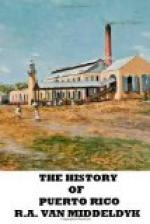But they came too late. The Antilles were slipping from Spain’s grasp; nor could Weyler’s inhuman proceedings in Cuba nor the tardy concession of a pseudo-autonomy to Puerto Rico arrest the movement.
The laws of March 15, 1895, for the administrative reorganization of Cuba and Puerto Rico, the basis of which was approved by a unanimous vote of the leaders of the Peninsula and Antillean parties in Cortes, remained without application in Cuba because of the insurrection, and in Puerto Rico because of the influence upon the inhabitants of this island of the events in the neighboring island.
After the death of Maceo and of Marti, the two most influential leaders of the revolution, and the terrible measures for suppressing the revolt adopted by Weyler, the Spanish Colonial Minister, Don Tomas Castellano y Villaroya, addressed the Queen Regent December 31, 1896. He declared his belief in the proximate pacification of Cuba, and said: That the moment had arrived for the Government to show to the world (vide licet United States) its firm resolution to comply with the spontaneous promises made by the nation by introducing and amplifying in Puerto Rico the reforms in civil government and administration which had been voted by Cortes.
He further stated that the inconditional party in Puerto Rico, guided by the patriotism which distinguished it, showed its complete conformity with the reforms proposed by the Government, and that the “autonomist” party, which, in the beginning, looked upon the proposed reforms with indifference, had also accepted and declared its conformity with them.
Therefore, the minister continued: “It would not be just in the Government to indefinitely postpone the application in Puerto Rico of a law which awakens so many hopes of a better future.”
The minister assures the Queen Regent that the proposed laws respond to an ample spirit of decentralization, and expresses confidence that, as soon as possible, her Majesty will introduce in Cuba also, not only the reforms intended by the law of March 15th, but will extend to Puerto Rico the promised measures to provide the Antilles with an exclusively local administration and economic personnel. “The reform laws,” the minister adds, “will be the foundation of the new regimen, but an additional decree, to be laid before the Cortes, will amplify them in such a way that a truly autonomous administration will be established in our Antilles.” Then follow the proposed laws, which are to apply, explain, and complement in Puerto Rico, the reform laws of March 15th—namely, the Provincial law, the Municipal law, and the Electoral law.




